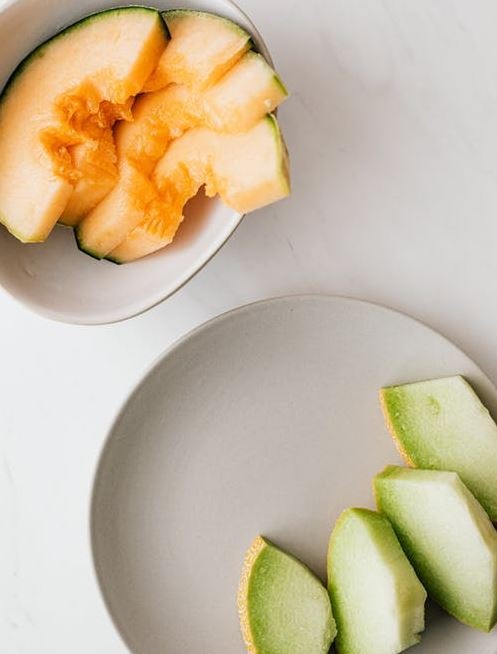Honeydew melon is a fruit that belongs to the melon species, Cucumis Melo. Although the fruit is visually appealing and provides many nutritious benefits, it also causes an allergy. People who have a honeydew allergy, are also likely to be allergic to other members of the melon family, including watermelon, cantaloupe, or cucumber. Let’s read more about how honeydew allergy occurs and different ways of handling this condition.
Causes of Honeydew Melon Allergy
Honeydew allergy, more commonly known as, Pollen Food Allergy Syndrome, is mainly caused by the cross-reacting allergens, found both in pollen and raw fruits/vegetables or some tree nuts. These pollen and similar proteins are immediately recognized by the immune system and cause an allergic reaction against it.
People with PFAS can eat the same fruit/vegetable in cooked form because the heat distorts the proteins and the immune system is no longer able to recognize the food. PFAS is mostly common in teens and adults who have been eating the fruit for some years without any problem.
Symptoms of Honeydew Melon Allergy
Just like some foods have an impact on the skin, Honeydew melon mostly affects the inside of your mouth. Symptoms of PFAS appear immediately after eating the melon. These include irritation or swelling in the mouth that is usually mild. Any kind of discomfort disappears quickly, because your stomach acid quickly destroys the offending protein, once swallowed.
For some people, these symptoms are mild, and they can continue to eat the fruit in small quantities. However, for others, the reaction is bothersome and they can’t eat the fruit throughout their lives.
How to Handle Allergy Caused by Honeydew Melon – Treatment of PFAS
There are different ways to handle this allergy, and by following a few tips and tricks, you’d be good to go! Let’s take a look at those precautionary measures.
1. Avoid Eating Honeydew
The first step to minimizing the PFAS is to avoid eating Honeydew in abundance. Pollen allergies can be reduced if the fruits/vegetables are eaten in cooked form, and since Honeydew can’t be cooked, it’s best to avoid it as much as possible.
If the allergic reactions are severe, try cutting down on the melon permanently, because, in allergic seasons, honeydew allergy worsens during the season of pollen. In case of mild symptoms, you can try eating canned Honeydew.
2. Be Aware of What You’re Eating
This goes without saying that you have to be aware of what you’re eating. Especially when you’re eating at a restaurant, talk to the employees or ask someone, but make sure that the ingredients of your ordered dish don’t contain Honeydew. When eating at home, don’t use the same surface to cook food that was previously used for Honeydew.
You can also try peeling the fruit before eating because the offending/triggering protein is often concentrated in the skin. Proteins in Honeydew are very labile and can be broken down easily and sometimes, even saliva acts as a great breaking agent.
You can also read about how juicing helps with different allergies.
3. Consult a Doctor
If you want to minimize the symptoms of PFAS as much as possible, try consulting with an allergist. He may recommend allergy shots, which help people in some cases. Additionally, he can also prescribe some allergy medications, such as Fexofenadine (Allegra), Cetirizine (Zyrtec), and Loratadine (Claritin), that can help lower the reaction.
People often get confused between food allergy and food intolerance. With the former one, a small amount of triggering food affects the immune system, while food intolerance only affects the digestive system and causes less serious symptoms. In case you have a food intolerance for Honeydew, you may be able to eat the melon in small amounts.
Read about the benefits of Honeydew juice.
4. Take a Honeydew Melon Allergy Blood Test
To know the intensity of your allergy, you can also take a Honeydew melon allergy blood test that measures your allergic reaction to Honeydew Melon.
Ragweed pollen also contains some proteins found in Honeydew and other melon fruits, and can also cause a reaction, similar to a honeydew allergy. Common symptoms of ragweed allergy are as follows.
- scratchy throat
- coughing or wheezing
- itchy, watery eyes
- runny nose or congestion
- sinus pressure, which may cause facial pain
- swollen, bluish-colored skin beneath the eyes
- decreased sense of smell or taste
Other Side Effects of Eating Honeydew Melon
1. Hampered Sugar Levels
Diabetes mellitus is recognized with elevated glucose levels in the blood. Therefore, too much melon intake may cause glucose overload, and might not be the perfect fruit choice for diabetic people. Additionally, the glycemic index (GI) of melons is usually high. Therefore, it’s suggested to consult a doctor before consuming them regularly.
2. Difficulty in Metabolizing
It isn’t ideal to binge-eat melons during the night. That’s because, in the evening, it gets difficult for the body to burn simple sugars. As the digestive system functions slowly at night, it is advised to not consume acidic and sugary foods after the evening which also hinders sleep quality. Melons are also filled with a high amount of natural sugar that contributes to weight gain.
3. Disturbs Gastrointestinal Tract
According to medical research, certain food combinations might affect the general functioning of gastric fire. So, either eat Honeydew melon alone or don’t eat at all. Eating it with other foods might disrupt your GI tract.
Melons are mostly fiber, water, and sugar. Certain microbes need sugar and moisture to grow and develop. Therefore, drinking water after eating melons might increase the microbial growth across your GI tract.
4. Missing out on Essential Macronutrients
Practicing ‘portion control’ with melons will help you a great deal. Although there are many benefits of Honeydew juice, consuming melons in high quantity might make you miss out on other foods with proteins and healthy fats. That’s why it is necessary to consume Honeydew melon in normal quantity and leave some space for other high-nutrition foods as well.
5. May Result in Diarrhea
The high water and fiber content of Honeydew melon make it a perfect fruit for summers, but overeating at one go may disturb your digestive system and cause Diarrhea. This is because melons contain a sugar compound, called Sorbitol that must be consumed in moderate quantity, as its higher intake might encourage problems like bloating, gas issues, and loose stools.
Handle with Care – and Avoidance!
No matter the amount of anti-allergy medications you take, the most reliable way of slowing down this condition is to be careful with its intake or avoid eating the Honeydew as a whole. While it may be difficult for melon enthusiasts, cutting down on the fruit is the only way to tackle this allergy in long term. For people with mild reactions to honeydew allergy, it’s okay to consume the fruit in small quantities. However, if the reaction worsens over time, make sure to visit a doctor and start the treatment immediately!






